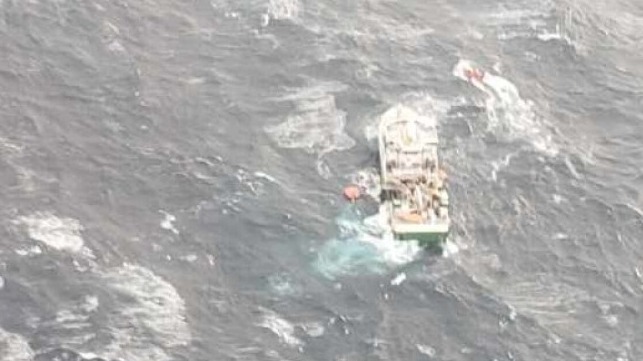U.S. and Canadian Coast Guards Rescue 31 From Sinking Trawler

In a daring mass rescue effort Tuesday night, the U.S. Coast Guard worked with the Canadian Coast Guard and Royal Canadian Air Force to evacuate the crew of a disabled trawler in the North Atlantic, about 130 miles south of Halifax. In heavy seas, with the vessel pitching and rolling, helicopter aircrews conducted 27 individual hoists to rescue the majority of the crew; the remaining four survivors transferred to a Canadian Coast Guard ship the next day.
At about 1900 hours on Tuesday, the Canadian Joint Rescue Coordination Center in Halifax contacted U.S. Coast Guard First District to relay a mayday call from the fishing vessel Atlantic Destiny. Her crew reported that she was disabled, on fire and taking on water. The crew managed to extinguish all fires and restore auxiliary power on their own, but they were still without propulsion and battling flooding.
Two Coast Guard Jayhawk helicopters and one Ocean Sentry SAR airplane were dispatched to the scene, along with a Royal Canadian Air Force Cormorant helicopter.
The conditions were rough, with winds at 35 miles an hour and 26-foot seas. Despite the foul weather, the Cormorant crew hoisted six of Atlantic Destiny's crewmembers aboard and lowered down two SAR technicians to help with dewatering.
This ship was sinking in the Atlantic Ocean last night.
— Canadian Forces in ???????? (@CAFinUS) March 3, 2021
Search and Rescue Technicians jumped down to the vessel to help hoist crew members to waiting Canadian and American aircraft.
All 31 crew members are safe today. pic.twitter.com/nrwDzFl5jV
The Jayhawk crews hoisted up another 21 crewmembers between them and delivered them to Yarmouth, Nova Scotia, where the fishermen were given a medical checkup.
Four of Atlantic Destiny's crewmembers remained on board, along with the two Canadian SAR technicians. They kept up dewatering efforts until Wednesday morning, when it became clear that they would have to abandon ship. The last personnel transferred to the Canadian Coast Guard vessel Cape Roger at about 0700 hours, and the Atlantic Destiny went down at 0936.
All crewmembers were safely rescued, and no injuries were reported.
"This was one of the craziest rescues that I've been a part of, for the situation and how many hoisted we had to do and how challenging it was trying to calm the aircraft to go get the survivors picked up," USCG avionics electrician Phillip Morales told CBC. "It was really, really challenging."

that matters most
Get the latest maritime news delivered to your inbox daily.
The cause of the fire is not yet known, the owner of the Atlantic Destiny told CBC.
Atlantic Destiny was a 140-foot trawler registered in Canada. It was not her first serious mechanical casualty: while operating in the same region south of Nova Scotia in 2017, she sustained a catastrophic propulsion failure. Canada's Transportation Safety Board found that she had experienced "multiple unexpected engine shutdowns" previously, and that on this occasion, the crew had bypassed the governor to restart the engine - leading to uncontrolled overspeed and the catastrophic failure of the gearbox fluid couplings.
